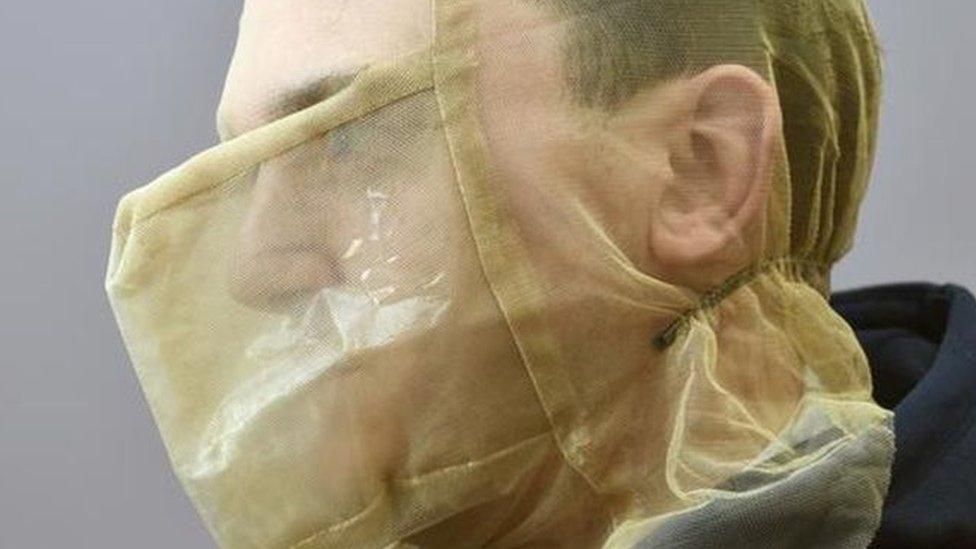Spit and bite guards: PSNI to use equipment as 'permanent tactic'
- Published

The equipment is made of a mesh-type fabric and is placed over an individual's head to minimise biting and spitting
The Police Service of Northern Ireland (PSNI) is to make spit and bite guards available to all frontline officers on a permanent basis, despite criticism.
The mesh-type guards are placed over an individual's head in a bid to protect officers from being bitten or spat at.
But human rights campaigners and children's legal representatives have called for the tactic to be scrapped.
The PSNI acknowledged concerns but said they were the "least injurious method" of restraint for officers at risk.
The Police Federation, which represents rank and file officers, welcomed the PSNI's decision saying the guards were "essential and badly-needed protection for officers".
"Too often, officers have had to cope with the revolting, vile and dangerous practice of being spat at during incidents," said the federation's chair, Liam Kelly.
"Similarly, officers have been bitten by individuals as they resisted arrest or were confronting officers."
However, organisations including Amnesty International, Children's Law Centre, the Committee on the Administration of Justice and Include Youth have claimed the continued use of the guards "may be in breach of equality legislation and therefore be unlawful".
The equipment, previously referred to as spit hoods, was first used by the PSNI in March 2020 at the start of the coronavirus pandemic.
They were introduced as a temporary measure after a number of suspects reportedly coughed on officers while claiming to have Covid-19.
But within months, the human rights campaign group Amnesty International was raising concerns about the use of the equipment, arguing that even the manufacturers had said they were not designed to protect against Covid transmission.
Last year, the Police Ombudsman for Northern Ireland recommended that the PSNI be banned from using them on children and young people.
'The only option'
On Thursday, the PSNI announced that its Strategic Management Board had decided "to adopt spit and bite guards as a permanent tactic for all frontline officers" and had informed the Northern Ireland Policing Board of its decision.
"We are acutely aware of the concerns that have been raised by the use of spit and bite guards," said ACC Chris Todd.
"However, in the absence of an appropriate tactical option to deal with assaults by spitting/biting, physical restraint remains the only option when attempts at de-escalation have proved unsuccessful.
"In this respect, our assessment is that the continued use of spit and bite guards offers the least injurious method of dealing with these egregious forms of assault."
However, Patrick Corrigan from Amnesty said: "The police have not met the threshold for the necessity and proportionality for this type of use of force.
"Given serious concerns around potentially dangerous physical and mental health impacts, particularly on vulnerable groups, spit hoods should be withdrawn from use."
The director of the Children's Law Centre, Paddy Kelly, said her organisation was "extremely concerned that spit and bite guards have been regularly applied to children since their introduction".
"The PSNI introduced spit hoods without undertaking an equality impact assessment and have now failed to publish the equality impact assessment results a full year on from it being conducted," she added.
"Their use on children is even more concerning given that children who come in contact with police are more likely to have a disability, mental ill-health or a learning disability."
'Sensible decision'
However, ACC Todd said the PSNI "is committed to a human rights-based approach in everything we do and we take our obligations to local communities and our officers and staff very seriously".
He added that they have "robust" mechanisms to monitor the use of spit and bite guards and have developed "extensive training and operational guidance for our officers in line with advice from the Northern Ireland Policing Board's Human Rights Advisor and the Police Ombudsman".
ACC Todd's statement said the PSNI intended to publish the results of its equality impact assessment on spit and bite guards "in the near future".
The Police Federation, which had long argued in favour of adopting the guards, welcomed the move as a sensible decision.
"Although the decision to make them a permanent piece of frontline officer equipment has taken an unnecessarily long time, it is heartening that we have finally reached a sensible and practical outcome," Liam Kelly said.
"The use of spit and bite guards fully complies with human rights obligations and fulfils the PSNI's responsibilities to do all it can to protect the health, safety and welfare of officers."
Related topics
- Published7 October 2021
- Published23 November 2020
- Published24 June 2020